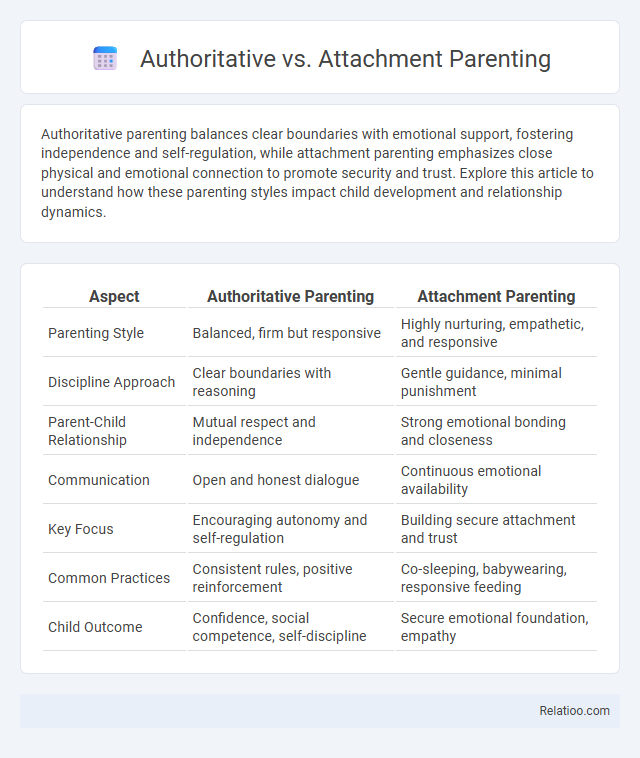Authoritative parenting balances clear boundaries with emotional support, fostering independence and self-regulation, while attachment parenting emphasizes close physical and emotional connection to promote security and trust. Explore this article to understand how these parenting styles impact child development and relationship dynamics.
Table of Comparison
| Aspect | Authoritative Parenting | Attachment Parenting |
|---|---|---|
| Parenting Style | Balanced, firm but responsive | Highly nurturing, empathetic, and responsive |
| Discipline Approach | Clear boundaries with reasoning | Gentle guidance, minimal punishment |
| Parent-Child Relationship | Mutual respect and independence | Strong emotional bonding and closeness |
| Communication | Open and honest dialogue | Continuous emotional availability |
| Key Focus | Encouraging autonomy and self-regulation | Building secure attachment and trust |
| Common Practices | Consistent rules, positive reinforcement | Co-sleeping, babywearing, responsive feeding |
| Child Outcome | Confidence, social competence, self-discipline | Secure emotional foundation, empathy |
Understanding Authoritative Parenting
Authoritative parenting combines high responsiveness with clear, consistent boundaries, fostering independence and social competence in children. Unlike attachment parenting, which emphasizes physical closeness and emotional bonding, authoritative parenting balances nurturing support with structured guidance. Research highlights that children raised by authoritative parents often exhibit better academic performance, higher self-esteem, and improved emotional regulation.
Key Principles of Attachment Parenting
Attachment parenting emphasizes nurturing a strong emotional bond between you and your child through practices like responsive feeding, co-sleeping, and gentle discipline to promote secure attachment. Unlike authoritative parenting, which balances warmth and structure with clear rules and reasoning, attachment parenting prioritizes constant physical closeness and empathy to meet a child's emotional needs. Authoritative parenting fosters independence with firm guidance, while attachment parenting centers on developing trust and emotional connection as the foundation of your child's development.
Core Differences Between the Two Styles
Authoritative parenting emphasizes balanced discipline and open communication, fostering independence while maintaining clear boundaries. Attachment parenting centers on nurturing strong emotional bonds through consistent physical closeness and responsiveness to your child's needs. You can distinguish these approaches by the authoritative style's focus on structure and reasoning versus the attachment style's emphasis on emotional connection and sensitivity.
Effects on Child Development
Authoritative parenting, characterized by high responsiveness and firm control, fosters children's social competence, self-regulation, and academic success. Attachment parenting emphasizes nurturing physical closeness and emotional bonding, promoting secure attachment and emotional resilience in children. Authoritarian parenting, marked by strict rules and low warmth, often leads to lower self-esteem and increased behavioral problems, negatively impacting child development.
Discipline Approaches Compared
Authoritative parenting balances firm discipline with emotional support, encouraging open communication and setting clear expectations to foster independence and responsibility in children. Attachment parenting emphasizes nurturing strong emotional bonds through responsiveness and physical closeness, often prioritizing empathy over strict rules when addressing behavior. Your choice between these approaches can shape your child's development, with authoritative discipline promoting self-regulation and attachment parenting focusing on emotional security.
Emotional Bond and Communication
Authoritative parenting fosters a strong emotional bond through balanced warmth and structure, promoting open communication and emotional regulation in children. Attachment parenting emphasizes nurturing close physical and emotional connections, prioritizing responsiveness and empathy to build secure attachments. Both styles enhance emotional bonds and communication, but authoritative parenting integrates clear expectations while attachment parenting centers on continuous physical closeness and emotional availability.
Long-term Outcomes for Children
Authoritative parenting, characterized by high responsiveness and clear boundaries, promotes strong long-term outcomes such as emotional regulation, academic success, and social competence in children. Attachment parenting emphasizes nurturing close bonds and emotional security, fostering trust and empathy but may sometimes limit the development of independence. You can achieve balanced child development by combining authoritative strategies with secure attachment, ensuring both autonomy and emotional support.
Cultural Influences on Parenting Styles
Cultural influences significantly shape parenting styles such as Authoritative, Attachment, and Authoritarian parenting, affecting expectations and practices within families. In collectivist cultures, Attachment and Authoritarian parenting often emphasize obedience and interdependence, whereas in individualistic societies, Authoritative parenting prevails with its focus on autonomy and open communication. Research indicates that cultural values deeply mediate how warmth, control, and responsiveness are expressed in each parenting style, impacting child development outcomes.
Expert Opinions and Research Findings
Expert opinions highlight that authoritative parenting combines warmth and structure, promoting optimal child development by balancing emotional support with clear boundaries. Research findings consistently show authoritative parenting is linked to higher academic achievement, social competence, and psychological well-being in children compared to attachment-focused or purely authoritative approaches. Your understanding benefits from recognizing that attachment parenting emphasizes emotional bonding, while authoritative parenting integrates nurturance and discipline, critical for fostering resilience and autonomy.
Choosing the Right Parenting Style for Your Family
Choosing the right parenting style for your family involves understanding the differences between authoritative, authoritative, and attachment parenting approaches. Authoritative parenting balances clear expectations with warmth and responsiveness, promoting independence and social competence. Attachment parenting emphasizes close physical and emotional bonding, nurturing security and trust, while authoritarian (or authoritative in some contexts) imposes strict rules with less flexibility, often leading to obedience without open communication.

Infographic: Authoritative vs Attachment Parenting
 relatioo.com
relatioo.com